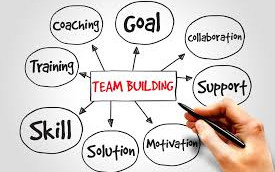Learning Objectives:
* Identify and practice new methods of dealing with others that promotes team spirit,
cooperation, and open communication.
* Develop simple techniques for creating cohesive work groups by recognizing and
praising each other. Practice and perfect active listening skills.
* Learn to take feedback from others without becoming defensive or angry.
* Gain skills that allow positive action to be taken on group performance problems without
causing conflicts or tension.
* Learn to give criticism in a way that helps the individual and the work group to develop
as a team.
Who Should Attend?
This course is specifically designed for team members, team leaders, team sponsors and
facilitators.
A single team can attend this workshop together, learning and practicing these crucial skills oneach other and dealing with their specific team issues or individual members from several different teams can attend the course at the same time, allowing them to learn and practice the skills in a nonthreatening, confidential atmosphere. Also, members of management can attend this course to learn to ?model? the behaviors that will be expected of employees throughout the organization.
Course Outline (3-day)
1. Teamwork Style
*Teamwork, teams and the bottom line
* Styles of behaving toward team members
* The aggressive, passive and teamwork styles
* The behavioral style continuum
* Small group exercises: Identifying teamwork styles
2. Creating a Positive Team Environment
* Three lessons about positive actions
* Why team members don?t praise each other at work
* Giving praise to team members
3. Listening for Team Effectiveness
* Characteristics of poor listeners on a team
* Poor listening habits
* Barriers to listening
* Techniques to overcome listening barriers
* Three rules for listening
* Showing understanding
* Small group exercises: Changing listening habits on the team
4. Dealing with Conflict and Criticism on the Team
* Two skills for taking criticism from team members
* Absorbing criticism
* Examples of ?Fogging?
* Clarifying criticism
5. A Problem-Solving Style
* Typical reactions when team members are criticized
* What is criticism
* The Problem-Solving Style instead of Criticism
6. Using Persuasion with Team Members Persuasion
*The benefits of persuasion
* Team persuasion cases: small group exercise
* Action step exercise: Individual plans to apply skills at work
TEAM BUILDING SKILLS FOR MAINTENANCE AND PRODUCTION TEAMS (TBS)
Newsletter - Get Updates & Latest News
Get in your inbox the latest News and Offers from

